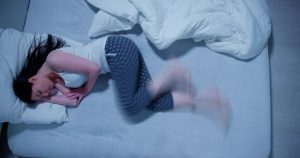Sleep Disorders 101: Restless Leg Syndrome
May 13, 2021

Restless Leg Syndrome (RLS), also called Willis-Ekbom disease (WED), is a neurological disorder that impacts seven to eight percent of the US population—across all ages. Sufferers of RLS are overcome by an urge to move the legs (and sometimes other body parts) oftentimes due to a “creeping, tugging, or pulling” sensation.
Symptoms of RLS usually occur in the evening, disrupting sleep, which is why many sleep physicians are well-versed in RLS and its implications on sleep health. In fact, the American Academy of Sleep Medicine shares that those with severe RLS generally get less than five hours of sleep a night. Individuals with milder RLS may get an adequate amount of sleep, but the quality of that sleep tends to be poor.
Regardless of where one lands on the spectrum of RLS severity, it’s a disorder that comes with short, and potentially long-term, consequences. Diagnosing the condition early on will save patients time and energy, and will help their long-term health.
What Are the Symptoms?
According to Restless Leg Syndrome Foundation, there are five key symptoms that everyone with RLS demonstrates:
- You are overcome with the urge to move your legs. More often than not, this is accompanied by that “creepy, tugging, or pulling” sensation described above.
- Symptoms begin or worsen when you’re resting or inactive.
- You find relief when you move, such as walking or stretching—but symptoms continue when you stop that movement.
- Symptoms are worse in the evening/night than during the day—for some, symptoms only occur at night.
- There isn’t another condition causing the symptoms (cramps, swelling, arthritis) + you have difficulty falling and/or staying asleep.
Doctors are able to diagnose RLS through a few methods. First, through your descriptions of your own experiences and symptoms. Being open with your doctor is essential for a correct and accurate diagnosis. From there, doctors typically review your medical history and rule out any other potential conditions that can cause RLS symptoms. If necessary, they may ask that you stay overnight at a sleep study lab.
It’s important to note that there is still a lot of research being done on RLS and its causes. As of today, the two biggest risk factors for developing RLS are gender & genetics. If RLS runs in your family, you are three to six times more likely to inherit the disorder. As for gender, women are more likely to develop RLS than men—twice as likely, in fact. For women, there is also a higher risk of developing RLS during pregnancy.
Treatment
There are two specific treatment paths for sufferers of RLS. These paths, more often than not, are intertwined.
One of these paths is focused around behavioral changes:
- Light, consistent exercise can help relieve symptoms. Be careful, as intense workouts can actually have the opposite impact. The American Academy of Sleep Medicine recommends going on walks or bike rides.
- Stress reduction such as yoga, meditation, and stretching can reduce symptoms. It’s particularly helpful to have a stress-reduction routine before bed. It also helps to take a hot bath in the evening, as that will relax your muscles.
- Cut out smoking and limit caffeine and alcohol intake. While smoking itself is a dangerous habit, it can also worsen existing health conditions, such as RLS. Caffeine and alcohol can also worsen your sleep and symptoms of RLS.
The other path is that of medication. Depending on the severity of your RLS, your doctor may recommend you go on one of the following:
- A medication that’s also given to those with Parkinson’s disease. These medications are helpful to treat RLS, as it replaces the brain chemical dopamine. Neurologists believe that dysfunctional dopamine signals are a cause of RLS. Treating the condition by increasing dopamine levels can ease RLS symptoms. It’s especially important to stay in contact with your doctor when taking dopamine altering medications, as a percentage of patients develop augmentation (more below).
- Sleeping pills to help those with severe RLS sleep more than five hours at night.
- Like with Parkinson’s disease, medication used to treat seizures can also treat RLS.
- Iron deficiency can contribute to the forming/severity of RLS, so your doctor may prescribe you iron supplements if you have such a deficiency.
It’s important not to begin medication without speaking to your doctor, who can prescribe the best route for your own personal needs and body structure.
What’s the Deal with Augmentation?
One of the most common but least understood issues in regards to the treatment of RLS is augmentation. Augmentation is the worsening of symptoms as a side effect of dopaminergic (dopamine agonists) medication. It’s important to be aware of your symptoms during treatment to ensure that you aren’t falling victim to augmentation. Symptoms of augmentation include:
- An increase in symptom intensity
- Symptoms beginning earlier in the day than usual
- You begin to experience RLS symptoms in other parts of your body
- You have shorter periods of relief while resting than you did before
- Your current medication dose doesn’t seem to be working, despite it having worked in the past
If you do begin to experience symptoms of augmentation, it’s essential that you speak with your doctor. Since there is no specific test that can be done to confirm or rule out augmentation, only you and your doctor can determine whether or not to change up your treatment plan. Augmentation is not life threatening, but will make your RLS symptoms worse, leading to potentially life-threatening associated conditions down the road.
You can learn more about augmentation here.
Restless leg syndrome is mentally and physically exhausting. If you suspect that you’re suffering from RLS, or haven’t been able to find proper relief, it may be time to consider speaking to a sleep specialist.
Ready to start your journey to better sleep health and overall wellness? Schedule your consultation today.
